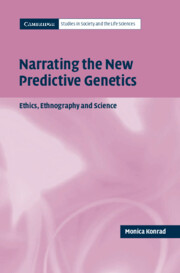5 - Reproducing exclusion
Published online by Cambridge University Press: 15 December 2009
Summary
In Chapter 4 we considered two substantive concerns informing an anthropological ‘ethno-ethics’ for the anticipatory study of probable life futures related to developments in predictive testing technologies. These are characterised by the dual attempt to (1) delineate kinship relations as changing techniques of heredity and moral genealogy; and (2) show how certain forms of relatedness are fundamentally at odds with the bioethical conception of individual autonomy that underpins the medicocentrism of ‘rights’-based claims to knowledge. When the issues underscoring the ‘right to know/right not to know’ debates are transposed ethnographically to a microanalysis of real-time decision-making, we are able to see how the ‘facts’ of a genealogical ethics are built up over time as local moralities of information disclosure and non-disclosure. While family members must discriminate between genetic information that they think is good to know or make known, and knowledge that they think is ‘bad’ to tell and share with others, such attempts frequently entail unresolved processes of moral decision-making, both within and across the generations. As embodied experiences of moral reckoning, these genealogical knowledge dilemmas also implicate a myriad of interests and divergent claims beyond the life of any one person. Now these plural interests, and their activation by social agents in the experience of everyday genetics, require the conceptual modelling of a relational ethics in contradistinction to earlier evolution-based accounts of a so-called ‘naturalistic ethics’.
- Type
- Chapter
- Information
- Narrating the New Predictive GeneticsEthics, Ethnography and Science, pp. 109 - 123Publisher: Cambridge University PressPrint publication year: 2005

